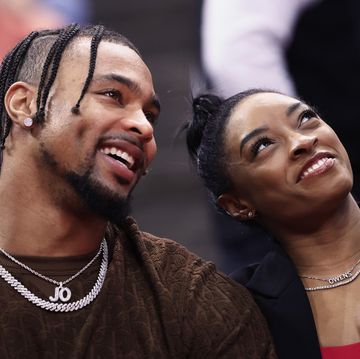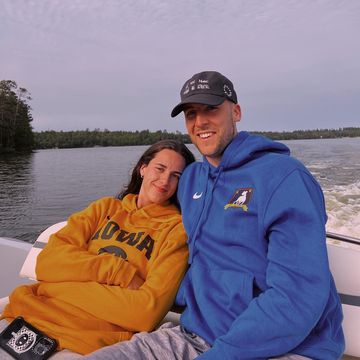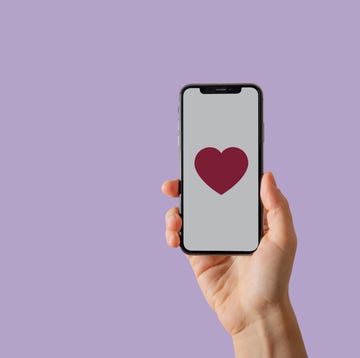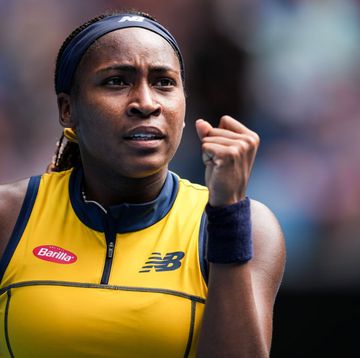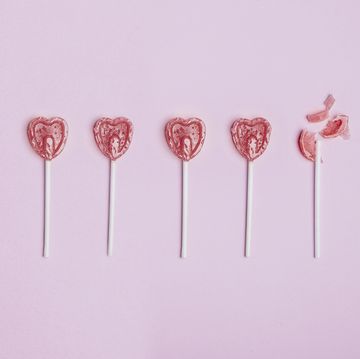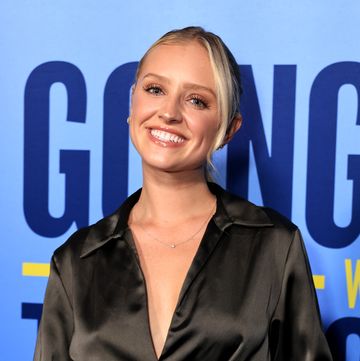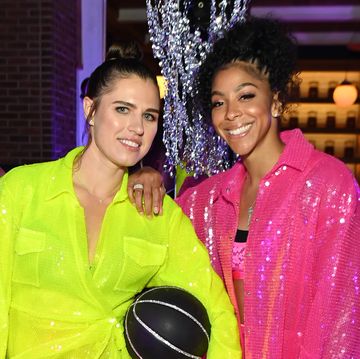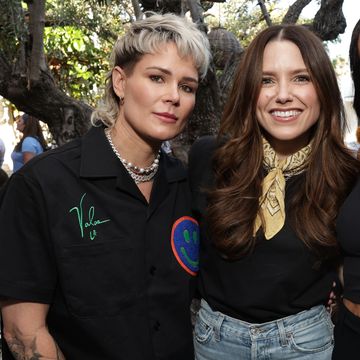Being in the dating scene has taught me a lot about myself: I always need a glass of wine before a first date, I can’t stand small talk, and I have a type so predictable that when I show my friends a prospect, they often cry deja vu. My crushes typically have facial hair, wear clothes a few sizes too big, and resemble any given member of a folk band. Or, as my friends like to call them: “men who look like they could use a shower.”
While my friends and I can agree on many topics, our dating preferences are not one of them. “He’s cute… for you,” they often tell me. Because while they look for finance bros above six feet, I go for the grunge factor. But I have wondered: Is my unyielding interest in Hozier and Noah Kahan doppelgängers holding me back from meeting… “The One”?
I once thought that having a clear-cut type would make it easier to find my person, but I've come to realize that maybe it's been doing me more harm than good. While my Instagram feed remains full of people from my hometown announcing their engagements and weddings, I remain looking for love… perhaps a little too narrowly.
Romantic “types” tend to develop from life experiences and cultural influences.
Put simply, a “type” is “a group of traits or characteristics that [someone] might typically be drawn to in terms of selecting a romantic partner,” says Betsy Chung, PsyD, a licensed clinical psychologist and author of The Couple Skills Workbook. Some people might have a very specific type, while others might just be looking for one or two key traits (think: confidence, lots of tattoos).
Having a type is completely based on nurture, not nature, explains Tara Suwinyattichaiporn, PhD, a professor of relational and sexual communication at California State University, Fullerton. Your romantic taste isn’t somehow embedded in your genetics, and it isn’t completely random, either. Rather, it’s based on a “combination of things that [you] have come across throughout your life that you’ve somehow become drawn to,” says Chung. Your preferences come from external factors that boil down to three main influences: your environment and culture, the media, and your peers.
“People’s types are often based on the cultural beauty standards of where you are from,” Suwinyattichaiporn says. For instance, pale skin is viewed as the blueprint for attractiveness in Asia, while some people spend hundreds of dollars acquiring a tan in America, she adds. Aside from looks, there are different cultural expectations surrounding occupation and wealth, which may also affect someone's type.
Pop culture, too—including TV shows and romance novels—subconsciously influences what we find attractive. Maybe you grew up watching Disney Channel shows and movies, wherein the most popular character was typically an outgoing jock. This could’ve led you to internalize the idea that these are desirable traits. Or maybe, when you were younger, you were drawn to someone whom your peers deemed unattractive, so you might’ve learned not to lean into those desires.
Confirmation bias—or a person’s tendency to favor information that is consistent with preexisting beliefs and values—can also show up in the way you experience attraction. “You begin to believe that you’re attracted to what's available to you, and might not be able to think outside that box,” says Pia Holec, PsyD, who serves as an expert psychologist on Lifetime’s Married At First Sight.
For instance, if you grew up in a rural neighborhood that lacked diversity, you might lean into what's familiar and comfortable. Or say you looked up to a father figure with facial hair—according to Chung, you might have subconsciously “developed a blueprint” for what a good partner looks like that’s not based on any personality qualities. “It’s not always necessarily what a person wants or what is best for them, but they’ve conditioned themselves to believe this is what they like because it’s all they’ve been exposed to,” Holec explains.
But once you begin to challenge these preconceived notions, your type can evolve as you do, adds Chung. As you pick up hobbies, move to different cities, or connect with new people (even platonically!), your desires may change.
Sometimes, having a type can benefit your dating life by providing consistency and increasing compatibility.
In some cases, having a physical type can help lead to natural attraction and chemistry, Suwinyattichaiporn says. But a type doesn’t always have to be physical: It can be based on character traits or hobbies that make a person who they are. And sometimes, those traits can be an important indicator of compatibility.
Especially when it comes to your lifestyle and core beliefs, being on the same page as a potential partner can be important, Holec says. For example, if fitness is an integral part of your life, it makes sense that you’d want to find a partner who would enjoy joining you on hikes or walks. Or if you’re a homebody, you’re likely better suited to someone who would rather stay in on a Friday night, too.
And in the era of dating apps, where there are sometimes too many options, being able to filter through people can help streamline the process and lead you to a compatible partner more quickly, Chung says.
But since someone's Tinder profile can only reveal so much, judging people based on whether they appear to fit your criteria is a dangerous line to walk, Holec explains. For instance, you might look at someone and swipe “no” before even reading their bio or having any kind of conversation with them, yet swipe “yes” on someone who used a photo from 15 years ago (or, dun dun dun…an AI-edited photo).
Only pursuing people who fit your type can also hold you back by enforcing unhealthy patterns.
In a lot of cases, a type can come from someone you experienced strong feelings for in the past. According to Suwinyattichaiporn, there are a few reasons for this: Maybe people who are familiar feel comfortable to you, or if a past relationship was sexually satisfying, your brain might think that similar people could bring similar sparks.
But it’s important to remember that there is a reason your past relationships didn’t work out, Suwinyattichaiporn says. Perhaps you feel drawn to people who are ambitious and career-oriented, but you’ve noticed that those same people often don’t have the time to commit to a relationship. “If you have developed a certain type that is obviously incompatible with you, but you keep enforcing it, you’re going to consistently have the same results,” Suwinyattichaiporn says.
In fact, some “types” might specifically go against what’s compatible with you, Chung adds. For example, if someone was raised in a very structured environment, they might be drawn to free spirits who give them a sense of adventure. But when it comes to resolving problems or building a life together, two people so different from one another may not make a good partnership.
It can also lead you to over-fixate on and overvalue someone who fits your type—while undervaluing those who don’t.
It's okay—even good—to be aware of the traits you find attractive (there’s nothing wrong with knowing what you like!). But having a type becomes a problem when you only seek out people with these traits down to a T. Being rigid about your type can lead you to overlook someone who might be a good fit for you, explain Chung and Suwinyattichaiporn.
“When [you] meet someone who seems to fit every single characteristic that you are looking for, you want to make it work so badly that [you might] overvalue this person,” Chung says. This can lead you to behave less authentically to secure a date or relationship, rather than being true to who you are. And once you’re together, you might find yourself glossing over incompatibilities (or even red flags) because you’ve convinced yourself that this is your perfect partner.
If you find yourself relying heavily on a physical type, you might also be missing out on people who are actually a great match for you on a deeper level. This is a common phenomenon, according to Chung: Many people were not raised to understand their own emotions and needs, so they often don’t know what kind of personality traits they want to pursue, leading them to look for certain physical attributes instead. “But when you continue to fixate on certain characteristics, you lose these opportunities to get to know other people, and to understand what you need to feel good in a relationship,” Chung says.
Ultimately, fixating on these characteristics can prohibit personal growth.
Ever heard the phrase “Don’t knock it until you try it?” That approach can–and should–be applied to your dating life. If you never expose yourself to something new, you won’t know if you like it better, Suwinyattichaiporn says.
Chung encourages her clients to identify the source of what they think their types are—because often, they’re just looking for general characteristics that they’ve been accustomed to desire. Then, she encourages her clients to challenge the notions they have about their type and look past those traits to find a partner that is best suited for them.
But not everyone is looking for a life-long partner, so Holec suggests identifying your intentions. If you’re just interested in a fun fling, it might not be harmful to stick to those you know you’re attracted to physically, she notes. But if you want a deep, meaningful relationship, you’re limiting yourself if you never venture outside your comfort zone.
If you do some soul-searching and self-interrogation and realize that you just want someone who can relate to your cultural background, or you just really find yourself feeling happier around more extroverted people, your type might be working just fine. But if you start to realize that your preferences are rooted in societal norms, based on fictional stories or characters, or (god forbid) related to an ex, you might be doing yourself—and your future self—a dating disservice.
So, should you try to date outside your type?
Dating outside of your type can give you “exposure to more diversity and variety,” Holec says. Humans are always evolving and (hopefully) always trying to learn, she adds, so “being with someone outside of your norm can help expose you to people who can help you become a better person.”
Suwinyattichaiporn agrees: “The more life experiences you have with all kinds of people, the more well-rounded you’ll become.” Plus, if you haven’t found success with your so-called "type," it’s extremely possible that someone who looks or acts very different from your exes could be a better fit.
So, if you’re ready to date people outside your type, but don’t want to compromise the chemistry, here’s what experts recommend:
1. Expand your type slowly.
“You don’t want to spend a lot of time and be inefficient by going on a date with someone you’re absolutely physically unattracted to,” Suwinyattichaiporn says. And on that note, you are allowed to have deal breakers—maybe your political opinions seem mismatched after one conversation, or someone’s Tinder bio makes it obvious you’re looking for different things.
By venturing slightly outside your type, you can explore a few new characteristics at a time. Maybe that means swiping right on someone who doesn’t look like any of your exes, but shares one of your favorite hobbies. Or maybe, it’s adjusting your Hinge settings to be less narrow. (I’m looking at you, Hinge users who have that Dealbreaker feature turned on for every category!)
2. Understand that chemistry grows.
Although most people want to experience that instant chemistry or love at first sight when they meet someone, Holec explains that it isn’t always reality. “If someone doesn’t initially feel that, that doesn’t mean it won’t develop over time,” Holec says. With experiences and intimacy shared, chemistry and attraction can grow, Chung adds.
Plus, sexual chemistry goes beyond the physical attributes, Holec explains. Tons of things can help aid attraction: a person’s pheromones, a skill they possess, how they treat you or others, their humor, the way you feel when they enter a room. And unlike physical characteristics that might change over time, character traits tend to stay consistent. “These are oftentimes the relationships that last the longest and are the most fulfilling, because they tend to have more substance,” she says.
That said, even if you go on a few dates with someone outside your type and that attraction doesn’t grow, the experience will help you learn more about traits that matter most to you, Suwinyattichaiporn adds. For example, you can figure out which characteristics are truly deal breakers (e.g., a clashing personality type), and which you might be willing to look past (e.g., they aren’t your preferred height).
3. Remember that no one will check every single box.
“There’s not going to be a single person in this world that is going to meet every single need,” Chung adds. “The person you end up with might also carry traits that you cringe at. For example, maybe they check all of the boxes for your physical type, but they might chew loudly or bite their nails.”
It can be beneficial to identify which traits are truly deal breakers and which are just wishful thinking or based on an ideal, fantasy scenario—because if you're waiting around for someone to fit an extremely specific archetype that fulfills your dream checklist, that person might not be out there.
4. Be open-minded.
Whatever you choose to do, it’s important to be open-minded toward that experience, Suwinyattichaiporn says. That person whose Hinge bio didn’t seem perfect on paper might just be the person to make you feel a way nobody ever has before. “Be patient and see where it goes,” Suwinyattichaiporn says.
So, even though I’ll continue to swoon over bearded men in baggy clothes, the next time I see someone who appears to have a very regimented showering schedule, I’ll give ‘em a shot (maybe).
Meet the Experts: Betsy Chung, PsyD, is a licensed clinical psychologist and author of The Couple Skills Workbook. Tara Suwinyattichaiporn, PhD, is a professor of relational and sexual communication at California State University, Fullerton. Pia Holec, PsyD, is a clinical psychologist who serves as an expert psychologist on Lifetime’s Married At First Sight.
Jordana Comiter (she/her) is a freelance writer from South Florida and a graduate of Tulane University and Northwestern University’s Medill School of Journalism. She loves covering all things lifestyle, including dating, entertainment + pop culture, health + wellness, travel, and more. When she’s not writing, she enjoys group fitness classes, wholesome romance novels, and live music.


